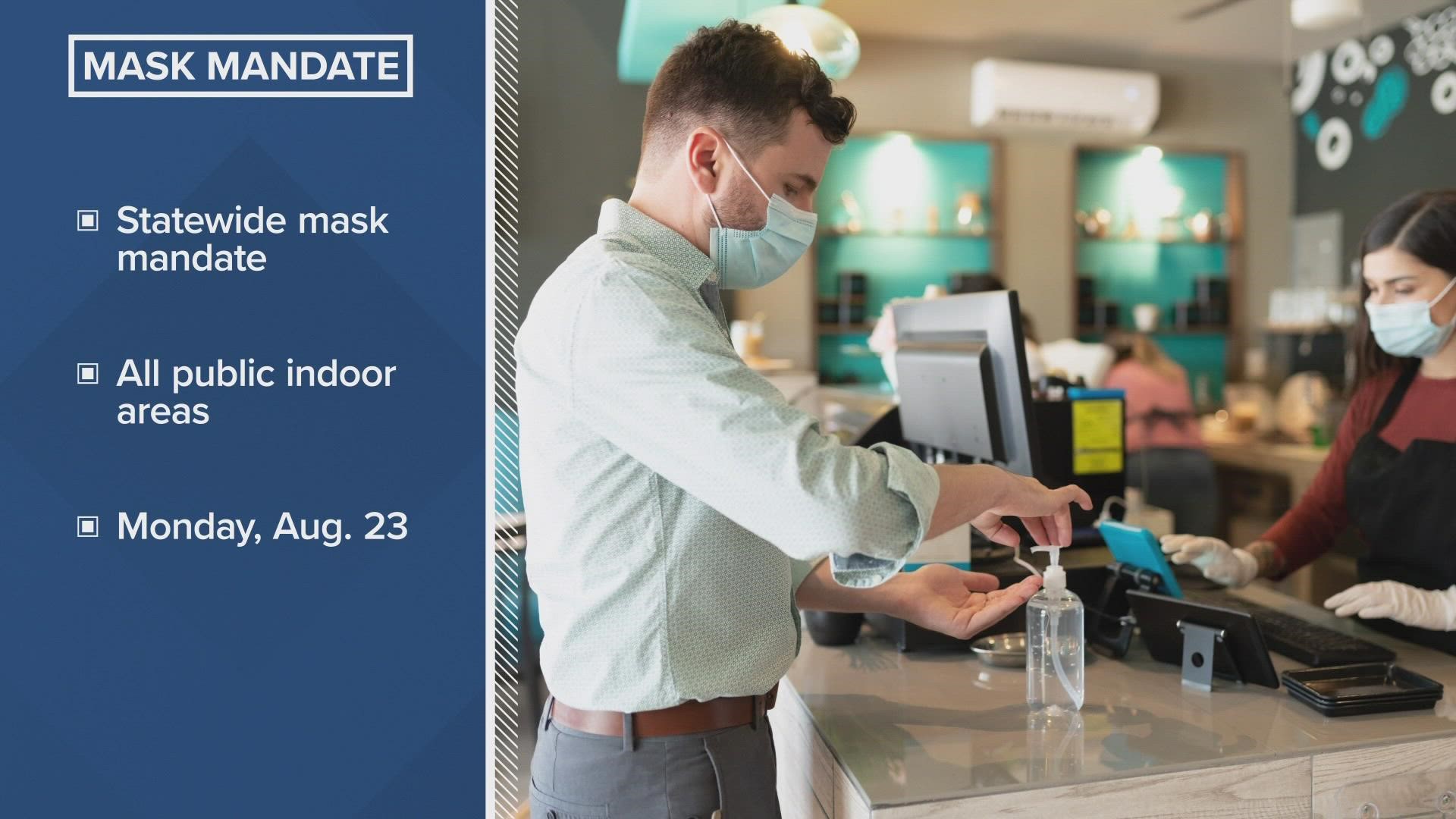SEATTLE — A universal mask mandate for indoor public spaces regardless of COVID-19 vaccination status went into effect in Washington state Monday.
Gov. Jay Inslee announced the expanded mask mandate for people age 5 and older last week. He also expanded the state’s COVID-19 vaccine mandate to all K-12 employees, in addition to employees at state colleges and most childcare and early learning providers.
The mandates follow weeks of escalating COVID-19 case rates and increasing hospitalizations caused primarily by the delta variant. Washington state recently broke its record for COVID-19 hospitalizations, which was previously set in December.
Washington's universal mask mandate applies to most public places, including restaurants, bars, grocery stores, businesses and public-facing offices, according to the Washington State Department of Health (DOH).
However, there are some limited exceptions to the universal mask mandate.
Location exemptions
According to the DOH, you are not required to wear a mask in the following situations:
- Fully vaccinated people do not need to wear a mask while working indoors in areas “not generally accessible to the public and when no customers, volunteers, visitors, or non-employees are present.”
- While isolated and working alone indoors. The DOH said examples of working alone include a single person working in an office with a closed door, delivery drivers with no face-to-face interactions with others, a crane operator in an enclosed cab and a single janitor in a building.
- Small indoor gatherings in a private residence.
- Swimming or engaging in other water sports or recreation.
- Sleeping, eating, drinking, bathing or engaging in other personal hygiene activities that require mask removal.
- While playing, training for, coaching, or officiating indoor sports, including “recreational, major junior hockey, part-time professional, collegiate, or professional sports settings.” The DOH said the exception “does not apply while the athlete, coach, or official is not actively engaged in the sporting, coaching, or officiating activity or to indoor gyms and other fitness facilities, such as dance, yoga, and martial arts facilities.”
- While engaged in performing arts, including leading religious services or other similar activities.
- When necessary to confirm a person’s identity and where face coverings are not allowed due to federal or state law.
- Communicating with someone who is deaf or hard of hearing and not wearing a face covering is essential to communication.
- When unable to put on a mask due to an emergency.
While it isn’t a part of the mandate, the DOH “strongly recommends” everyone wears a mask in crowded outdoor settings like concerts, sporting events and fairs when social distancing isn’t possible.
On Monday, the Seattle Mariners announced fans are required to follow the state’s mask mandate in indoor areas of T-Mobile Park, including team stores, bathrooms, indoor clubs and restaurants and while in indoor concourse areas like the Terrace Club.
Fans are not required to wear masks while in their seats, in private suites or when actively eating or drinking. However, all fans are “strongly” encouraged to wear a face mask in all areas of the ballpark, regardless of vaccination status.
Individual exemptions
The following people are also exempt from the universal face mask mandate, according to the DOH:
- Children younger than 5 years old. The DOH said children under the age of 2 should never wear face coverings due to suffocation risks. With assistance and close supervision of an adult, children ages 2-4 are “strongly recommended” to wear a face mask in public settings, but are not required under the mandate.
- Anyone with medical, mental health, developmental or cognitive conditions, or a disability that prevents them from wearing a mask. The DOH said this includes, but is not limited to, anyone with a medical condition that would have their breathing obstructed by wearing a mask, or anyone unable to remove a face covering without assistance.

